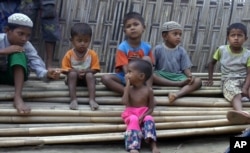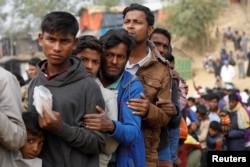A United Nations official says Myanmar security forces continue to subject the remaining Rohingya Muslims in northwest Rakhine state to human rights abuses.
"The ethnic cleansing of Rohingya from Myanmar continues," Andrew Gilmour, the U.N.'s assistant secretary-general for human rights, said in a written statement Tuesday, basing his conclusion from Rohingya Muslims who had recently arrived in overcrowded refugee camps in neighboring Bangladesh.
Nearly 700,000 Rohingya have fled into Bangladesh since last August to escape a brutal crackdown by Myanmar security forces. Rohingya witnesses and human rights activists have accused the armed forces of committing murder, rape and arson.
Gilmour now says Myanmar forces have changed their tactics from "the frenzied blood-letting and mass rape of last year to a lower intensity campaign of terror and forced starvation."
“The U.N.'s findings sadly echo our own — there is no question that the Myanmar authorities’ vicious campaign of ethnic cleansing against Rohingya is still ongoing. Fleeing Rohingya told us how they are still being forcibly starved in a bid to quietly squeeze them out of the country," said James Gomez, Amnesty International’s director of Southeast Asia and the Pacific.
Myanmar and Bangladesh have agreed to repatriate scores of Rohingya Muslims, but Gilmour says any hope of "safe, dignified and sustainable returns" are "impossible under current conditions."
Acclaimed New York Times columnist Nicholas Kristof described the situation in Rakhine state as "a slow motion genocide" in a first-hand account of his visit to the troubled region published last week. Kristof says the Rohingya remain confined to their villages and a huge concentration are denied most education and medical care.
Kristof says the government has prevented international aid groups from traveling to Rakhine state to help the Rohingyas.







